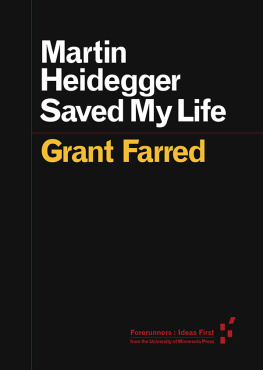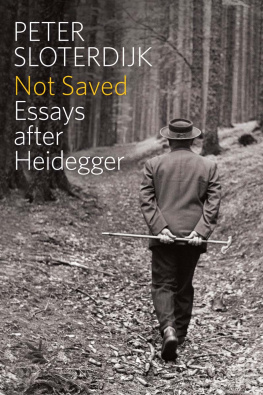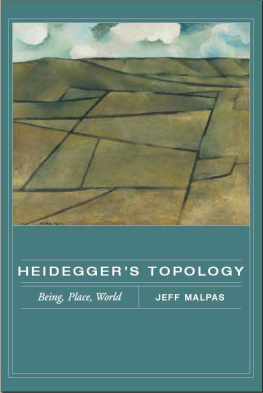Farred - Martin Heidegger Saved My Life
Here you can read online Farred - Martin Heidegger Saved My Life full text of the book (entire story) in english for free. Download pdf and epub, get meaning, cover and reviews about this ebook. year: 2015, publisher: University of Minnesota Press, genre: Art. Description of the work, (preface) as well as reviews are available. Best literature library LitArk.com created for fans of good reading and offers a wide selection of genres:
Romance novel
Science fiction
Adventure
Detective
Science
History
Home and family
Prose
Art
Politics
Computer
Non-fiction
Religion
Business
Children
Humor
Choose a favorite category and find really read worthwhile books. Enjoy immersion in the world of imagination, feel the emotions of the characters or learn something new for yourself, make an fascinating discovery.
Martin Heidegger Saved My Life: summary, description and annotation
We offer to read an annotation, description, summary or preface (depends on what the author of the book "Martin Heidegger Saved My Life" wrote himself). If you haven't found the necessary information about the book — write in the comments, we will try to find it.
Farred: author's other books
Who wrote Martin Heidegger Saved My Life? Find out the surname, the name of the author of the book and a list of all author's works by series.
Martin Heidegger Saved My Life — read online for free the complete book (whole text) full work
Below is the text of the book, divided by pages. System saving the place of the last page read, allows you to conveniently read the book "Martin Heidegger Saved My Life" online for free, without having to search again every time where you left off. Put a bookmark, and you can go to the page where you finished reading at any time.
Font size:
Interval:
Bookmark:
Copyright 2015 by Grant Farred
All rights reserved. No part of this publication may be reproduced, stored in a retrieval system, or transmitted, in any form or by any means, electronic, mechanical, photocopying, recording, or otherwise, without the prior written permission of the publisher.
Published by the University of Minnesota Press
111 Third Avenue South, Suite 290
Minneapolis, MN 55401-2520
http://www.upress.umn.edu
The University of Minnesota is an equal-opportunity educator and employer.
This book is dedicated to my brother, Glynn Arthur Farred,
23 October 196310 December 1966
You are gone now
just as in my elder youth
my first dreams are gone.
John Snow, Len BatesCricketer and Coach
We do not know what thinking is. But we know when we are not thinking.
Martin Heidegger, Was heit Denken?
Teach thinkers to think,a needed knowledge in a day of loose and careless logic; and they whose lot is gravest must have the carefulest training to think aright.
W. E. B. Du Bois, Of the Wings of Atalanta
The white woman asked me, Would you like another job? This was just the question for Guy Fawkes Day.
November 5, Guy Fawkes Day, 2013, was crisp, a bite in the air, like autumn days are supposed to be. As someone who grew up in South Africa, a former British colony, Guy Fawkes Day has a special significance for me. Guy Fawkes Day has historically been celebratedin Britain and many of its erstwhile colonies, among them Australia, New Zealand, and the seventeenth-century American colonieswith displays of fireworks. (Guy Fawkes Day, or Night, was sometimes known as Bonfire Night.) The event commemorates the British states successful quelling of the Gunpowder Plot in 1605, an attempt by English Catholics to assassinate King James I and replace him with a Catholic monarch. One of the plotters, Guy Fawkesor Guido Fawkes, as he is also sometimes knownwas caught beneath the House of Lords with the explosives he was going use to blow up the House. As a cultural figure, Guy Fawkes (and the revolutionary plot) is probably most familiar to Americans as the character at the heart of the movie V for Vendetta. (Guy Fawkes is recast as the slightly dubious freedom fighter V of the movies title.)
I was on sabbatical for the fall semester of 2013, but I had a meeting with my research assistant on Guy Fawkes Day morning. I wore, as is my custom, a suit and a tie. This is how I dress for the office, a suit and a tie or a jacket and tie. My advisor in graduate school, Andrew Ross, is a proud Scot who dresses with wonderful panache. Andrew once remarked to me when I complimented him on a suit he was wearing, Only the ruling class can afford to dress down. Ever the anti-Westminster Scot, Andrew was mocking, ever so drolly, the Queen and her tattered gardening cardigans. He is right, of course, the Queen can wear what she wants; shes the Queen, whether shes dressed up in all her royal finery or mucking about the garden in well-worn garb, surrounded by her innumerable corgis. Secure in its position, the ruling class does not have to bother with the niceties of appearance, except for important occasions of state. In truth, taking care with how I dress is a lesson Id learned growing up in my working-class family in the township of Hanover Parka sprawling public housing estate located on the sandy wastes of the Cape Flats, about half an hour southeast of Cape Towns city center. For the working class, especially the aspirational working class (a category to which most of my family belonged), the appearance of respectability is all. It is a lesson Ive learned well.
I came home after the meeting at my office and changed into work clothessturdy, water-resistant boots, warm sweat pants, and a sweat shirt, topped by a puff pullover and a wool hat. We live, my wife, Jane, Ezra, our son (who was five years old then), and I, in the Village of Cayuga Heights, the toniest neighborhood in Ithaca, New York. Ithaca is home to Cornell University, where Jane and I teach. The residence in which Cornell University houses its presidents is located just a quarter mile down the street from us, to give you some idea of the fortunes of the neighborhood. We have colleagues almost immediately to the north, south, and west of us. In Ithaca terms, this is prime real estate and possessed of a bucolic beauty. It is possible to discern, among Ithacas stately mock-Tudor houses and pretty Cape Cod cottages, the winding streams and the scenic waterfalls, what W. E. B. Du Bois idealizeswriting during his tenure at Atlanta Universityas the low hum of restful life.
Our house is long and sprawling, complete with swimming pool and large grounds (about an acre and a third, not in the least shabby, not even by the standards of Cayuga Heights), and is populated by a fair number of trees. Oak and hickory, mainly, which shed like crazy in the autumn; and the hickory sheds nuts, which attract the deer. I like raking leaves. (On the other hand, I have little affection for the deer who hurdle our four-and-a-half-foot fence with impunity.) Raking leaves is repetitive, almost mechanical labor, but it edifies the soul, or so I tell myself. Good thing I like raking, because its a never-ending job in the autumn. As soon as you rake the leaves into piles and put them by the side of the road so that the Village of Cayuga Heights Department of Public Works can collect them, theres more. And more... I enact the role of a small-time Sisyphus, except the boulders an endless pile of leaves that I rake up the hill, almost literally, again and again. Sometimes I take the easy option and rake them down the hill.
Id been raking for about forty minutes on Guy Fawkes Day when a late-model Volvo sedan, white (it had to be white, didnt it?), stopped at the top of the hill, where our house ends, and then reversed about twenty meters to where I was raking. Inside were two distinctly middle-class white people in their late seventies. The elderly Ithaca couple might very well be the prototype of Volvo buyers whom Stanley Fish mockscondemns, evenin his mischievously titled essay The Unbearable Ugliness of Volvos; the white couple in the white Volvo seem like the kind of people who would eschew ostentation (anticommercial virtue) in the name of safety. Volvos are the perfect car for liberals, Fish argues, because they have no value other than the utilitarian. All over America today (but especially in college towns and other liberal enclaves), the place of Volvos, still reputedly as safe as ever, has been taken by the even more utilitarian, safe (safer than the Volvo), and ugly Subarus. The couple in my Volvo look like they may very well be the kind of academics (I have no idea if they were active or retired faculty, or perhaps even nothing of the sort) who, as Fish sardonically remarks, one day in the mid-seventies, stopped buying ugly Volkswagens and started buying ugly Volvos.
The man, in the passenger seat, was wearing a tweed jacket, while the woman was clad in what looked like a fairly high-end sweater; fine wool, maybe cashmere, if I know my fabrics. She beckoned me over. This act of hers, it was no small thing. Or, this act of hers, small to her, was anything but a routine gesture to me. This act of hers, it immediately put me on my guard.
I am a diasporized black South African. I was raised under the strictures of apartheid. The 1976 student rebellion known as Soweto erupted when I just six months into high school. Growing up under apartheid left its mark on me. In truth, it would have been impossible for it not to because apartheid educated me politically in ways, I have learned in the almost three decades I have lived in the United States, both predictable and unexpected. Because of my political past (which is never really past; one is forever molded by and held within such an experience), I have as a matter of political necessity (apartheid demanded it, if one was to negotiate the unequal terms of South African society with any success) developed a sense for what an encounter that begins with a white person hailing a black person might entail. In such an encounter, as in Deleuzes notion of the statement, everything... is real and all reality is manifestly present. Being summoned, in this way, by a white woman, this was real: being hailed in this way, this was a real statement of political intent by the white woman. For me, this was a statement loaded with political intent. This encounter, taking place in autumnal, liberal Ithaca, New York, was hauntingly familiar to me. Of course, Ithaca 2013 is not Soweto 1976 or, say, Hanover Park in the midst of the 1980s anti-apartheid insurrection, but being so hailed, this was for me, deep in my bones, nothing othernothing lessthan an apartheid mode of reality. Everything that I knew, even that which I thought I might have forgottenor repressedcame flooding back, with a deliberate force that took me no time, no time at all, to recognize.
Font size:
Interval:
Bookmark:
Similar books «Martin Heidegger Saved My Life»
Look at similar books to Martin Heidegger Saved My Life. We have selected literature similar in name and meaning in the hope of providing readers with more options to find new, interesting, not yet read works.
Discussion, reviews of the book Martin Heidegger Saved My Life and just readers' own opinions. Leave your comments, write what you think about the work, its meaning or the main characters. Specify what exactly you liked and what you didn't like, and why you think so.










